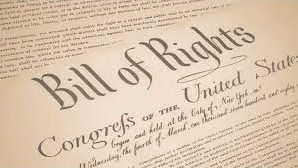 The U.S. Citizenship and Immigration Services website states the following: The Bill of Rights was ratified on December 15, 1791. Today we recognize December 15 as Bill of Rights Day. Understanding the Bill of Rights is also an important part of the naturalization test. Knowing about Bill of Rights Day (December 15) and its importance is not common today. I have discussed constitutional questions with those seeking citizenship and found a greater appreciation of the nature of rights than those who have grown up as natural citizens. Why is this so? Because families and schools often don’t teach the importance and original meaning of the Constitution or its first ten amendments, the Bill of Rights.
The U.S. Citizenship and Immigration Services website states the following: The Bill of Rights was ratified on December 15, 1791. Today we recognize December 15 as Bill of Rights Day. Understanding the Bill of Rights is also an important part of the naturalization test. Knowing about Bill of Rights Day (December 15) and its importance is not common today. I have discussed constitutional questions with those seeking citizenship and found a greater appreciation of the nature of rights than those who have grown up as natural citizens. Why is this so? Because families and schools often don’t teach the importance and original meaning of the Constitution or its first ten amendments, the Bill of Rights.
Today the ignorance among many Americans is evidenced by the fact that some public officials have unofficially recognized “rioting” as a natural right of expression. Understanding the origin and meaning of the Bill of Rights would correct such an opinion, distinguishing riots from lawful assembly under the rule of law. Socialistic revolt has always ended up with a government more tyrannical than the one from which people revolted. In addition, our Bill of Rights rests on the notion that rights are God-given. Schemes of large, controlling governments rest on the notion that rights are government-granted, and as mere privileges granted by politicians they can be adjusted, redefined and removed by those in power.
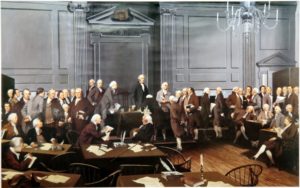 When the Constitutional Convention met in Philadelphia during the summer of 1787, the states were initially going to discuss commercial relations between them. However, the discussion grew to consider a new government, resting on the rule of law (a constitution) rather than the rule of States on one hand or the rule of a federal government on the other. As an express powers document, the only power that the federal government had was what was expressly delegated to it by the States and written in the document. This would provide a great check and balance to protect the liberty of states and individuals.
When the Constitutional Convention met in Philadelphia during the summer of 1787, the states were initially going to discuss commercial relations between them. However, the discussion grew to consider a new government, resting on the rule of law (a constitution) rather than the rule of States on one hand or the rule of a federal government on the other. As an express powers document, the only power that the federal government had was what was expressly delegated to it by the States and written in the document. This would provide a great check and balance to protect the liberty of states and individuals.
Though some States refused to ratify the federal constitution without a Bill of Rights specifically delineating those rights that a government can never take away, others did not want a Bill of Rights at all, fearing one day we would not understand the nature of government as an express powers document. In other words, if a list of 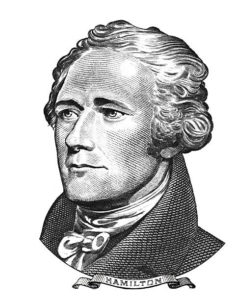 rights is included, we no longer have strictly delegated powers. As Alexander Hamilton wrote “I… affirm that bills of rights, in the sense and to the extent in which they are contended for, are not only unnecessary in the proposed Constitution, but would even be dangerous. They would contain various exceptions to powers not granted; and, on this very account, would afford a colorable pretext to claim more than were granted. For why declare that things shall not be done which there is no power to do?”
rights is included, we no longer have strictly delegated powers. As Alexander Hamilton wrote “I… affirm that bills of rights, in the sense and to the extent in which they are contended for, are not only unnecessary in the proposed Constitution, but would even be dangerous. They would contain various exceptions to powers not granted; and, on this very account, would afford a colorable pretext to claim more than were granted. For why declare that things shall not be done which there is no power to do?”
James Madison believed, however, that the danger of not including a Bill of Rights was greater than the danger of future generations forgetting its purpose since so many States refused to ratify the constitution unless it had one. He thus delivered on his promise to introduce amendments clarifying specific rights that the federal government can’t take away. He received 189 amendments, and on September 25, 1789, Congress put twelve before the States and on December 15, 1791, the tenth state to ratify, Virginia, made it official that the Bill of Rights would contain ten amendments. The Bill of Rights, became, in essence, a giant STOP SIGN to the Federal government to refrain from interfering with State rights in the areas listed.
 Today, it is imperative that we understand the nature of these Amendments. They protect States from the intrusion of the Federal Government, but they are being perceived as federal weapons against the States (mostly by the Supreme Court); exactly the opposite of what was originally intended. But the 9th and 10th Amendments were specifically included in order to correct this notion.
Today, it is imperative that we understand the nature of these Amendments. They protect States from the intrusion of the Federal Government, but they are being perceived as federal weapons against the States (mostly by the Supreme Court); exactly the opposite of what was originally intended. But the 9th and 10th Amendments were specifically included in order to correct this notion.
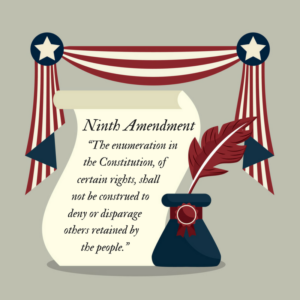 Just because amendments 1-8 specifically list rights does not mean that others not listed are not already retained by the people themselves. This amendment preserved the idea that God-given rights are given directly to individuals, not to States or governments.
Just because amendments 1-8 specifically list rights does not mean that others not listed are not already retained by the people themselves. This amendment preserved the idea that God-given rights are given directly to individuals, not to States or governments.
The 10th amendment clarifies the fact though specific rights are listed, the Constitution is still an express powers document where the only power the federal government has is what is delegated to it by the Constitution. There are no “assumed powers.” The only powers given up by States or the people is what is expressly stated in the Constitution. We are a constitutional Republic whose powers are decentralized in the people and delegated from the bottom-up to States and the Federal Government.
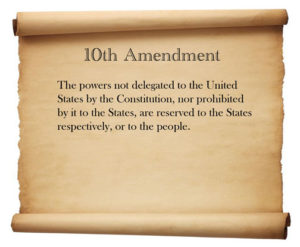 The issues we are facing involving religious liberty, self-defense, peaceful assembly as well as petitioning for redress of grievances are all foundational within the 1st and 2nd Amendments. They lay the groundwork for other rights such as private property, being innocent until proven guilty, impartial juries and bail that is set in proportion to the crime. It seems all of these are on the news virtually every day. They all rest on the statutes of Biblical law given to ancient Israel and incorporated into the system of justice by the time of the American Revolution and the ratification of our Constitution.
The issues we are facing involving religious liberty, self-defense, peaceful assembly as well as petitioning for redress of grievances are all foundational within the 1st and 2nd Amendments. They lay the groundwork for other rights such as private property, being innocent until proven guilty, impartial juries and bail that is set in proportion to the crime. It seems all of these are on the news virtually every day. They all rest on the statutes of Biblical law given to ancient Israel and incorporated into the system of justice by the time of the American Revolution and the ratification of our Constitution.
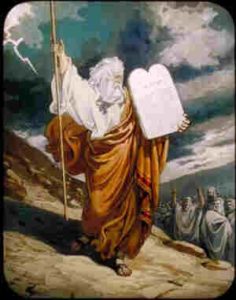 Dr. Enoch Cobb Wines, a Congregational minister and author of the landmark book Commentaries on the Laws of the Ancient Hebrews in 1852, desired to set before those of his day the truth that the government and justice system of America was based on Ancient Israel, not Greek or Roman law. A condensed version of Volume 2 of his work was published by the Plymouth Rock Foundation in 1997 and is still available today in our on-line bookstore. E.C. Wines wrote:
Dr. Enoch Cobb Wines, a Congregational minister and author of the landmark book Commentaries on the Laws of the Ancient Hebrews in 1852, desired to set before those of his day the truth that the government and justice system of America was based on Ancient Israel, not Greek or Roman law. A condensed version of Volume 2 of his work was published by the Plymouth Rock Foundation in 1997 and is still available today in our on-line bookstore. E.C. Wines wrote:
“A cheap, speedy, and impartial administration of justice was another of those great ideas, on which Moses founded his civil polity. Under the Hebrew constitution, the poor and the weak were not to be the victims of the rich and the strong. The small as well as the great were to be heard, and equal justice awarded to all, without fear or favor.” Oh that we might have this kind of justice restored today!







